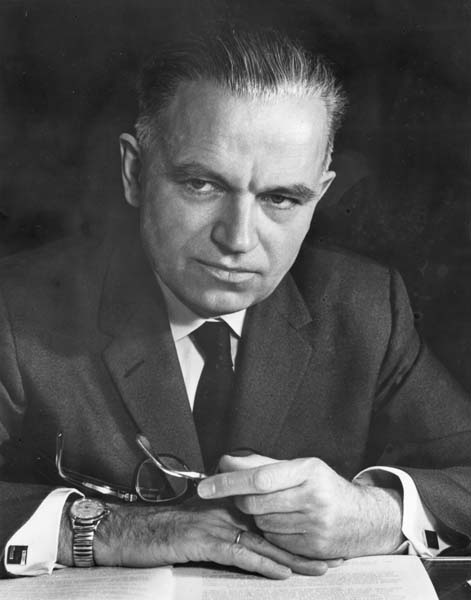Gerhard Herzberg
Gerhard Herzberg

© Physics Today Collection, AIP Emilio Segre Visual Archives
Gerhard Herzberg was born in Hamburg, Germany, on December 25, 1904. He received his early training in Hamburg and subsequently studied physics at the Darmstadt Institute of Technology where, in 1928, he obtained his Dr. Ing. degree. For the next two years he did post-doctoral work at the University of Göttingen and the University of Bristol. In 1930, he was appointed lecturer and senior assistant in the Physics Department of the Darmstadt Institute of Technology.
In August 1935, Herzberg was forced to leave Germany as a refugee and took up a guest professorship at the University of Saskatchewan, Saskatoon, Canada. A few months later he was appointed research professor of physics, a position he held until 1945. From 1945 to 1948 Herzberg was professor of spectroscopy at the Yerkes Observatory at the University of Chicago. He returned to Canada in 1948 and was made principal research officer and shortly afterwards director of the Division of Physics at the National Research Council. In 1955, after the division had been reorganized into two subgroups—a pure and an applied physics group, Herzberg remained director of the Division of Pure Physics, a position which he held until 1969 when he was appointed Distinguished Research Scientist in the recombined Division of Physics.
Herzberg contributed many new ideas to the field of atomic and molecular spectroscopy. He and his associates determined the structures of a large number of diatomic and polyatomic molecules, including the structures of many free radicals difficult to determine in any other way (among others, those of free methyl and methylene). Herzberg applied these spectroscopic studies to the identification of certain molecules in planetary atmospheres, in comets, and in interstellar space.
Active in promoting the field of spectroscopy, Herzberg served as president or vice president of several international commissions dealing with spectroscopy. He was also vice president of the International Union of Pure and Applied Physics from 1957 to 1963. He was president of the Canadian Association of Physicists and president of the Royal Society of Canada.
Herzberg received numerous honors for his work over his lifetime. These include: the Nobel Prize in Chemistry, Fellow of the Royal Society of Canada and of the Royal Society of London; Bakerian Lecturer of the Royal Society of London; Royal Medal from the Society; George Fischer Baker Non-Resident Lecturer in Chemistry at Cornell University and Faraday Medalist, OSA’s Frederic Ives Prize, and Lecturer of the Chemical Society of London. He was an honorary member or Fellow of a number of scientific societies, including the American Academy of Arts and Sciences, OSA, and the Chemical Society. He was also a Foreign Associate of the U.S. National Academy of Sciences and a member of the Pontifical Academy of Sciences. He was a Companion of the Order of Canada.
Gerhard Herzberg died on 3 March 1999.
Document Created: 26 July 2023
Last Updated: 28 August 2023
